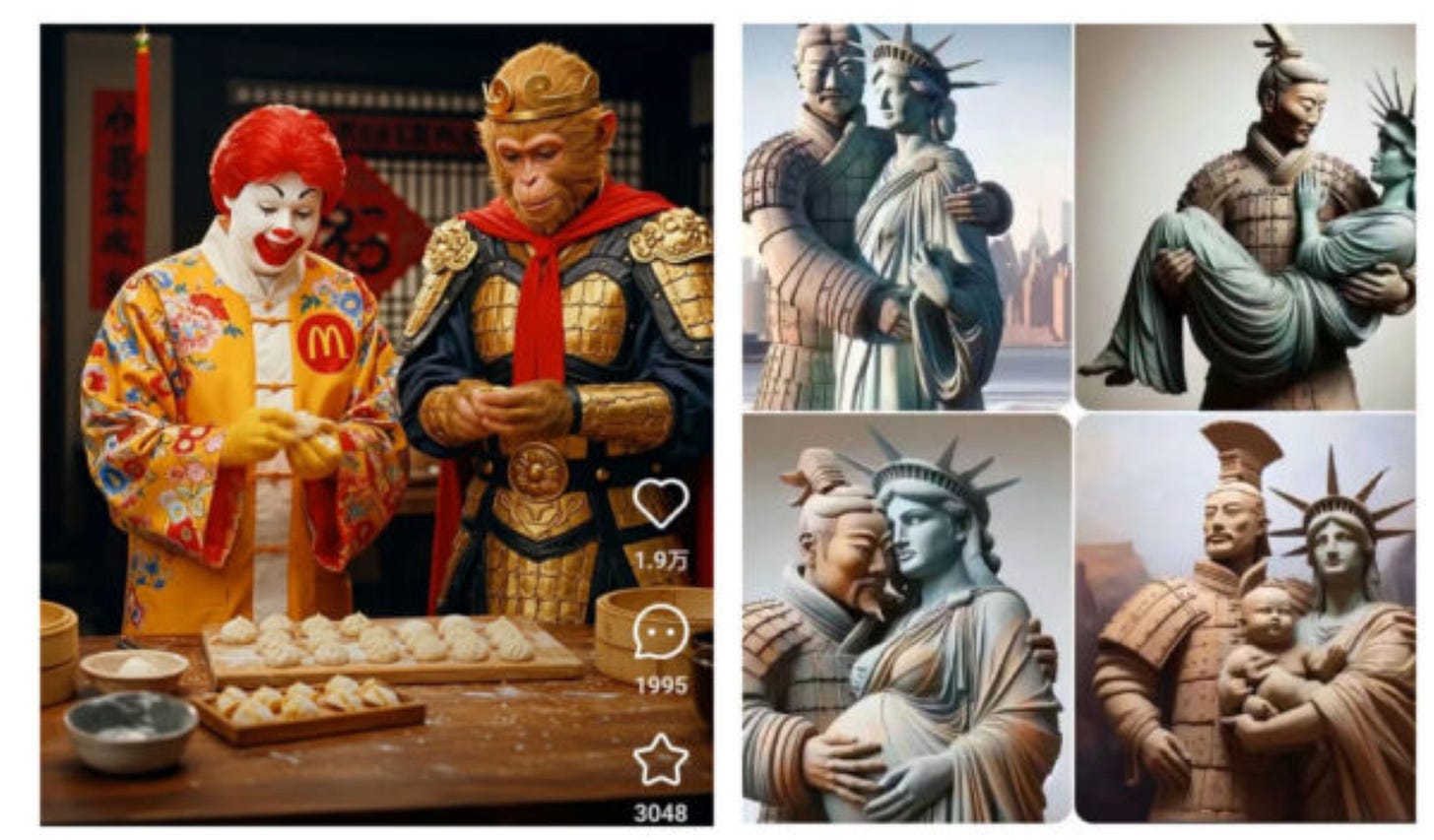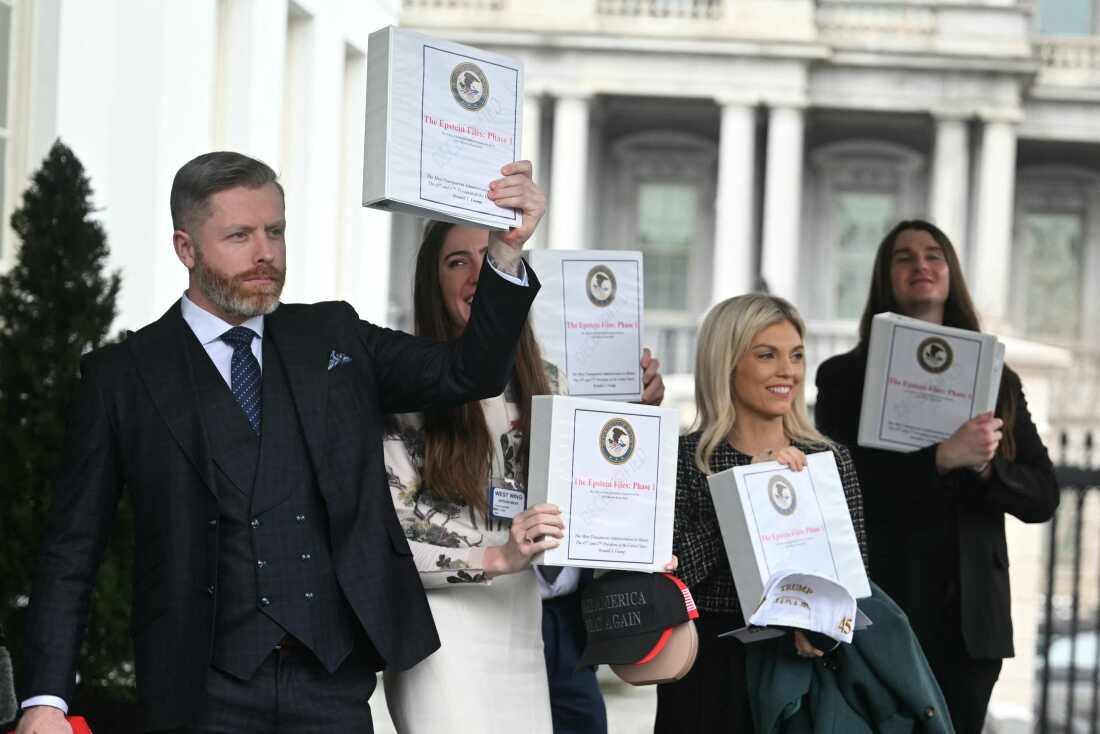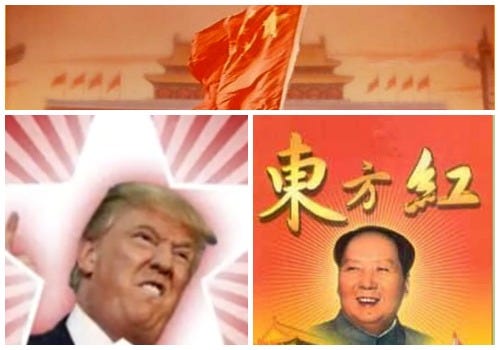Quarrelsome Lovers
Washington’s slide into Beijing-style authoritarianism amid a fake US-China conflict

In case you haven’t noticed, China’s soft power has arrived firmly on American soil. For months, my American friends have been posting videos unboxing Labubus as part of the craze around the Chinese toy brand PopMart. I recently attended the American debut of China’s Starbucks rival, Luckin Coffee, at its flagship location in Manhattan. And for many months, Americans have been ogling over TikToks of Chongqing city scenes and raving about the Chinese video game Black Myth: Wukong, based on China’s monkey king legend (also pictured above, with Ronald McDonald). Perennial arguments that China lacked soft power—often made in contrast to Korea’s K-pop or Japan’s video games—have now been thoroughly debunked. Chinese culture is here and Americans like it. American culture, of course, is also beloved by Chinese consumers: American music, movies, brands, and tourists have been warmly received during my visits to China over the years.

The two economies are deeply interdependent. Despite its push for domestic consumption, China remains an export-driven economy, while America relies on inexpensive Chinese manufacturing (especially with looming inflation). And the connection runs deeper: each country holds the key to the other’s technologic future. America depends on Chinese rare earth minerals for defense and manufacturing, just as China depends on U.S. microchips and semiconductor technology for AI (via USA’s Nvidia, USA-IP driven ASML, and West-aligned TSMC). But there’s a warning here for Americans: China is both making progress on its indigenous chip manufacturing and becoming less dependent on exports to America. America erstwhile hopes to develop its rare earth output.
Beginning in earnest in 1978 with Deng Xiaoping, China adopted America’s market liberalism which led to an explosion of prosperity and lifted millions out of poverty. This is a miracle of capitalism worth celebrating, especially as it marked a long-overdue course correction from the trauma of the Cultural Revolution and Great Leap Forward. Yet liberal economic reforms were never matched by civic liberalization. The Communist Party maintained strict authoritarian control, which has only deepened as technological progress bolsters its capacity for surveillance.
The USA too is learning lessons from China, but they are all the wrong ones. Alas, the American people voted (albeit narrowly) for an American political system much closer to China’s. Everyday, we witness news from Washington that would feel more familiar in Beijing.
America has a new foreign policy of ruthless realpolitik: abandoning the decades of democratic allies based on shared values and the rules-based order, opting instead for Beijing-style transactional relationships. We neglect our traditional democratic allies in Europe and NATO and instead heap praise on strongmen in Moscow, Pyongyang, Beijing, Riyadh, and Jerusalem. Once a defender of state sovereignty in Ukraine and the South China Sea, America has since taken up its own desire for conquest (or at minimum, spheres of influence) in Canada, Greenland, and the Panama Canal. Just as China looked the other way when its ally Russia invaded Ukraine, so too America tolerated Israeli incursions into Syria, its planned resettlement of Gazans, and its further settlement of the West Bank.
Domestically, our policies increasingly echo China’s authoritarian toolkit. We ban entry or expel legal immigrants and visitors based on past social media posts and newspaper editorials. State-aligned media is becoming central to U.S. news consumption, while independent professional journalism is sidelined (e.g., the AP punished for declining to adopt “Gulf of America”). Tucker Carslon, Joe Rogan, and the All-in Podcast hosts each fashion themselves as contrarian outsiders yet they dominate the market and their hosts and guests are often regime members, ex-officials, megadonors, and allies. Twitter remains dominant for real time news while it too is run by a former appointee (albeit one who has fallen out of favor) and deboosts professional journalists or those linking to journalism. Populist influencers (on the Left and Right) like Tim Pool and Brenden Dilley are invited to White House press briefings to ask questions that paint the administration in a favorable light, meanwhile gullible podcaster “citizen journalists” are paraded at the White House (eg, brandishing binders of vapid “Epstein Files,” feigning transparency).
The regime’s ire isn’t just focused on the journalists. All independent power centers are under attack. Our Ivy League universities—flawed but still the envy of the world—now face relentless legal assaults under the Trump regime, targeting campus speech, admissions, and faculty appointments. CBS and Columbia bend the knee, while the AP and Harvard resist. Like Mao, Trump vilifies scholarly institutions as the “elite” and seeks to install regime loyalists and oust political enemies. Those who resist face endless lawsuits and threats.
Likewise, American industry is increasingly expected to show public fealty. Tech giants grovel with tribute to Trump’s inauguration and Coinbase infamously sponsored a Beijing-style military parade. Industries and companies are rewarded for fealty (eg, Paramount paid a $16M settlement to Trump ahead of its merger and has been likened to a “bribe”), while those who oppose face relentless attacks from the Executive branch (eg, Disney was also battered into a settlement). The Trump administration is engaged in Beijing-style purges (the most recent being the State Department and Intelligence services, and next perhaps the Fed Chair), ever suspicious of betrayals or imperfect allegiance to the Ruler. America’s immigration enforcers are sweeping people off the streets by masked men to be whisked away to prison camps in El Salvador or to hostile home countries with little due process. Meanwhile, the USA is reverting to Chinese-style cultural conservatism too, erasing the names and celebration of figures from historically underrepresented or marginalized groups (eg, Harvey Milk and Mount Denali) while glorifying political allies, “traditional” families, and the majoritarian ethnicity, language, and religion.
It's a shame that these are the lessons the USA is learning from China, because in other ways, China really could be a positive example for the United States. China has the world’s best factories where one worker manages multiple robots, unlocking massive scale and working up the value chain to precision manufacturing. Meanwhile, the Trump administration bans the automation of American ports. China provides vast funding for education, the sciences, and renewables, producing more high quality peer-reviewed research than the USA and EVs that are better and cheaper than anything available anywhere else. Trump shutters the Department of Education, makes indiscriminate cuts to the sciences, espouses endless falsehoods about renewable energy, and subsidizes the coal industry. Instead of emulating China’s incredible nationwide transportation infrastructure from trains to tunnels to bridges to roadways, the Trump Department of Transportation fights New York’s subway funding because it disfavors cars.

The disparagement of China by Trump is inconsistent with the Trump administration’s revealed preference of an American system more like China’s. It’s also in contrast to our two countries obvious interdependence and cultural affinity for each other. And despite theatric displays of criticism for China, Trump still heaps praise on its authoritarian leadership, is uncritical on the valid topics of human rights or territorial expansionism, is endlessly delaying the bipartisan ban of TikTok, and ceding entire industries to China (solar, EVs, robotic manufacturing, basic science research, vaccines). The USA of yesteryear fashioned itself as a shining “city on a hill” on such core principles as individual liberties, responsible statecraft, the balance of power, and rule of law. These were once cherished, sacrosanct values of Americans across political divides, yet now they are fading away. Many Americans will miss them when they are gone, yet it is difficult to restore freedoms once they have been forfeited.

It bears remembering that America still retains some institutional heft, albeit diminished. While this is of little solace to those of us who have depressingly watched the steady decay with the rise of populism in the 2010s, it is still real and meaningful to those, for example, who have found refuge in American from a true totalitarian regime. We still have elections and can say most anything and live how we please. And there remain real power centers in universities and media that haven’t yet buckled under the authoritarian boot of the regime. Both Harvard and the Wall Street Journal are in battles with the Trump administration to preserve their institutional integrity. Yet the fact that they have to fight for survival against their own government is the point, and their success will rely on the impartiality of one of the final bulwarks in government: the judiciary.
America isn’t a lost cause, but it has been doing a lot of losing. To win again, American should return to its foundational civics and alliances, but that’s only half the battle. Just as China looked to the US to liberalize its economy and deliver prosperity to its people, the US should learn from China’s industriousness, infrastructure, and modern cities to deliver on the promise of the future.






